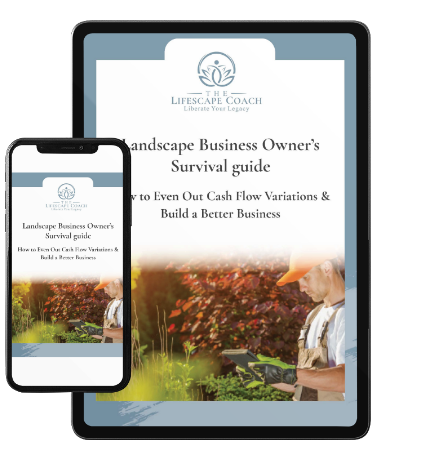The Top 5 things to do before you start a landscape business
Many people start a landscape business looking to make a killing. But, sadly, the only thing they end up killing, is the business. Why is this and how can you avoid it if you're seriously thinking about making the leap yourself?
First and foremost, you should not – and really cannot –start and grow a business that’s entirely about making money. It has to be about something else. If you’re thinking of launching a landscape business, you better be doing it because you love the idea of creating something beautiful, functional, and lasting on the land using plants and all manner of materials not to mention getting your hands dirty. The money comes after that. Why? Because if it's about the money first, the tail ends up wagging the dog and everything you do is colored by the desire to squeeze money out of it. Your decision-making becomes based on profits, not pleasing your clients. And that's no way to grow and sustain a landscape business successfully. And don’t get me wrong here - profit must be on the priority list - it’s just dangerous to make it the only priority.
No matter how you approach your new business, one thing is clear: you absolutely must understand the basics of how to run a business first. This is no place for flying by the seat of your pants. Now, you may be passionate about landscaping and the romantic notion of working for yourself, calling all the shots, and making a ton of money along the way, but all that pipe-dreaming is irrelevant to starting, growing, and maintaining a successful, profitable landscape business.

Entrepreneurs love to use the word “passion,” but it’s a double-edged sword. Loving something will cause you to put up with a lot before it kills you and your business. In fact, there’s no better way to kill a creative passion than to try to turn it into a business. If you want to protect your passion, there are five key things to do first before you launch your landscape business:
5 things to do before you start a landscape business.
1. Have a clear picture of what you want your business to look like in 10 years.
That means imagining your role, the people who will support you, the clients you work for, and the results you bring to the world. You don’t necessarily need a formal business plan, but you must imagine and document your business, so you have a framework within which to work and grow. Like any creative activity, you have to imagine it first – just like designing a garden.
2. Be brutally honest with yourself about what you can and cannot do.
If you can build stone walls but can't work with numbers, then get someone to deal with the numbers. If you’re gifted with the ability work with perennials, but don't know trees or shrubs then you need to direct your activities appropriately. If you are not comfortable with sales and marketing, then you need be brutally honest with yourself and get help to fill in those critical gaps. Focus on building a complete business team and outsource what you’re not good at instead of beating your head against the wall trying to do it all. You may not even realize the number of “hats” you wear every day. However, it’s important to recognize that you can’t do everything yourself if your landscape business is to be successful and sustainable. It’s okay to have someone else tell you what you need to do for certain aspects of your operation. An aversion to having a boss is the wrong reason to start a business.
3. Identify what you want to offer your clients, get into the details of doing that, and focus on it every day.
It’s hard to start a business that tries to offer something to everyone because it spreads you too thin. Start out hyper-focused on something specific and build a clientele and service business around that. Be focused on the particular services you’re good at, the type of client you want, and the geographical location where you know you can provide the best service. You can always grow later. Start narrow and focused on delivering outstanding support so that you can start with a solid foundation from which you can more easily grow.
4. Build a transparent process that helps you see your entire business from the moment you get a lead to the final delivery of your service.
Map out the path from beginning to end. Be clear on how you are going to get from point A to point B and make it scalable to allow for growth and more workers. The chain of delivery must be mapped out and then refined so you can respond to results as you implement services. Do not let “paralysis by analysis” stop you. Think of your plan as a work-in-progress -- start with something and then refine it as you go. The trick here is the refinement. You don’t want to skip that critical step in the evolution of your business. Refining never goes away.
5. Don’t forget you!
Central to everything you do must be your lifestyle. Don’t let business adversely affect your ability to be a person. Build boundaries between the business and your personal life and then build a company that works within those boundaries. This helps you thrive in both your business and personal endeavors. It’s so easy for a business to invade the personal side of the person who runs it – you! It is harder to fix that once it happens than to build healthy boundaries in the first place and build a business that honors those boundaries.
Hindsight is 20/20. Looking ahead is harder.
Having been in this business for 30-plus years, I can look back now and see with rear view mirror clarity how much time I wasted, in the beginning, chasing my tail. I was young, unmarried, and without children. It was easy to make mistakes then and just keep plowing ahead, with little thought of the consequences. But I would have been much further along as a business if I had taken these five steps when I first started.
Also, remember to balance your life. If you start your business with that in mind, then it's easier to make subtle shifts in your business to follow the subtle shifts in your personal life as they unfold. In the end, you will be happier and more successful.
Image Copyright: 123RF Stock Photo
Landscape Business Owners Survival Guide



